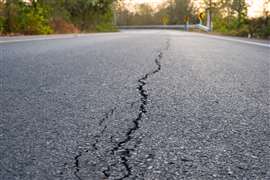Read this article in French German Italian Portuguese Spanish
Why South African authorities are claiming progress in fight against construction corruption
01 February 2024
 Image: ISENGARD via AdobeStock - stock.adobe.com
Image: ISENGARD via AdobeStock - stock.adobe.com
As it heads into a general election year, South Africa is claiming progress on cracking down on rampant corruption in its construction sector.
South Africa’s Infrastructure Built Anti-Corruption Forum (IBACF), formed in 2020 to put systems in place to detect and prevent corruption, recently congratulated the South African Police Services (SAPS) and law enforcement on their “progress” tackling criminal elements.
The country has a particular problem with extortion and violence on construction sites, with a “construction mafia” that the IBACF said seeks to extract protection fees from local construction companies and contractors or extort a portion of the cost of an infrastructure project.
Specific individuals affiliated with the construction mafia are also recruited to work on site.
The activity has resulted in a spate of construction companies performing shoddy work on public contracts before abandoning the site, leaving projects either incomplete or running well behind schedule.
But the IBACF, convened by the National Department of Public Works and Infrastructure (DPWI) and the Special Investigating Unit, said SAPS has now made 722 arrests resulting in 52 convictions so far, following investigations in 712 cases.
One of the most notable recent arrests has been of Ralph Stanfield, and his wife Nicole Johnson.
The pair were arrested after several Cape Town construction contractors were forced to abandon government housing construction sites following alleged acts of intimidation and violence.
Once the sites were abandoned, the Western Cape Government’s human settlements department allegedly awarded Johnson’s company, Glomix House Brokers, the contracts for completing the abandoned projects, according to South Africa’s Special Investigations Unit.
The arrests come against the backdrop of continued economic harm to South Africa’s construction sector, as a result of alleged mafia activity.
In the period leading up to 2022, up to R63 billion (US$3.4 billion) of projects were reported to be delayed or cancelled as a result of extortion tactics and disruption.
Corruption ‘overshadowing’ construction industry
Such is the extent of the problem that a 2023 report entitled Perceptions of Corruption in the South African Construction Industry warned that it “continues to overshadow the fundamental contributions of the construction industry, preventing the delivery of infrastructure services”.
A survey of 270 respondents in the industry found that bribery exists in the South African construction industry and that it affects whistleblowing.
It concluded, “Respondents felt corruption led to late completion of projects, poor workmanship, and led to the use of sub-standard materials.
“Respondents agreed that poor procurement processes resulted in the appointment of incompetent contractors and that practitioners engage in unethical behaviour due to desperation for work. Findings support, corruption is a major issue in the South African construction industry and approaches are needed to eradicate the corruption.”
In summer 2023, South Africa’s public works and infrastructure minister Sihle Zikalala warned contractors and developers that they could be prosecuted and barred from doing any further business with the government if they were caught cheating the public purse.
Zikalala called for an audit on all blocked and incomplete projects, estimated to run into the billions of rands and met with the IBACF to assess work to minimise the threat of corruption and fraud in construction.
Critical timing
IBACF’s announcement of progress on the issue comes at a critical time for South Africa’s ruling party, the ANC.
The country goes to the polls to elect members of Parliament this year and the ANC has faced criticism from its political opponents for failing to do more to tackle corruption that has left critical parts of the country’s infrastructure on the brink.
The country has suffered years of rolling blackouts (known as “load shedding”) amid underinvestment in the country’s ageing energy grid. The average South African spent five hours a day without electricity in 2023, according to blackout statistics compiled by independent energy analyst Pieter Jordaan.
Those blackouts have in turn led to water shortages, exacerbating issues with poorly maintained infrastructure that has also led to major water leaks. Some 70m litres of clean water are lost to leaks every day due to the poor state of the country’s water infrastructure, with some wealthier households in the country now taking to drilling their own private boreholes.
Meanwhile, corruption is leading to a loss of skills in the sector. A Corruption Watch report into South Africa’s water sector warned that 30,000 jobs in the construction sector were lost in 2019. One specialist contractor, EsorFranki warned in its annual report that, “Alongside contract delays, non-awards and failure to implement stated policy, we have also experienced an increase in unjust tender awards which are then challenged in court. This lengthy legal and court process not only delays the contract commencement but also incurs legal fees, impacting results.”
The IBACF said it encouraged all South Africans who are aware of criminal actions such as threats of violence or extortion that may lead to the loss of projects and work opportunities to report crime through various channels, including the local SAPS station, a national anti-corruption hotline, the SIU, or even the presidential hotline.
It added, “As the SAPS reports back on arrests and convictions, we warn the public that there are consequences for people who engage in illegal activities within the construction sector. The IBACF thanks the whistleblowers and law enforcement agencies for their bravery and tremendous efforts in tackling these criminal matters.”
STAY CONNECTED



Receive the information you need when you need it through our world-leading magazines, newsletters and daily briefings.
CONNECT WITH THE TEAM








